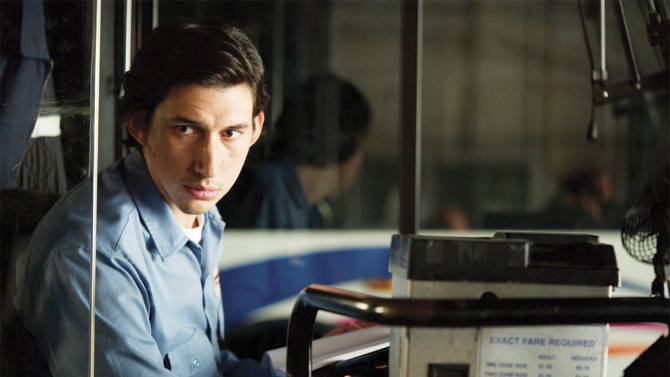Paterson
Paterson, 2016, 1 ½ stars
Meet monotony
Paterson mistakes vacuity for subtlety
From The Orlando Weekly, January 20, 2017
Minimalism is Jim Jarmusch’s bread and butter.
Actually, it might be just his bread, as the writer-director probably considers butter ostentatious. He even concocted a quiet, subtle vampire film (Only Lovers Left Alive), a rarity for that genre. But with Paterson, his latest dramedy starring Adam Driver, his attempt at minimalist ultra-realism collapses into nothingness thanks to an empty screenplay and dialed-in performances.
Driver plays a driver (of a bus). Adding to that verbal repetition is the fact that his name is Paterson and he and his wife (Golshifteh Farahani) live in Paterson, New Jersey. He’s also a poet, though he keeps his writing to himself, content to scribble in his secret journal. His inspiration is William Carlos Williams (another double name), a modernist writer (also from New Jersey), whose most epic work is titled – you guessed it – Paterson. Driver’s character sees twins everywhere he goes, thus further emphasizing the doppelgänger theory, or life’s duality or some other metaphor that doesn’t quite work except in an amusing, absurdist way.
If Jarmusch had focused more on the absurdity of human existence or embraced the style of Charlie Kaufman, the film would have been more successful, both thematically and aesthetically. Instead, it is simply a week in the tedious life of its title character. Paterson gets up every day around 6:15 a.m., eats Cheerios, goes to work, observes mundane human interactions on his bus, comes home, gets the mail, kisses his wife, has dinner and takes his nightly stroll to the neighborhood bar (with his dog, Marvin), where he drinks a beer and chats with the bartender (Barry Shabaka Henley) and fellow patrons.
Nothing much happens until the end, but I imagine that is precisely Jarmusch’s intention. This is a slice of life, an examination of one man’s existence, framed by the one thing that makes him unique: his poetry. But Jarmusch’s observational realism is doomed by a screenplay that isn’t as honest as it thinks and, therefore, collapses into emptiness and pretention. The film is also hampered by stiff performances, including, surprisingly, that of Driver, who can usually be relied on for quiet charisma. Instead, the only player with the requisite naturalism and humanity is not even human. It’s Marvin, who won the Palm Dog Award at Cannes. (Yes, that’s a real prize given to the best animal actor and inspired by the festival’s top award, the Palme d’Or.)
“Sometimes an empty page presents more possibilities,” a mysterious fellow poet tells Paterson in a scene that momentarily rescues the film from vacuity. That’s a nice motto for life, but a film must be more than an empty page.
As I was finishing this review, I peaked at Rotten Tomatoes, an admittedly dangerous thing for a critic to do. This film sits at 94 percent, so perhaps I’m missing something. Or maybe some reviewers are simply too bashful to admit that Paterson is just plain boring (lest they be judged a plebeian) and have convinced themselves there’s more here than meets the eye. There isn’t. The emperor – or, in this case, the bus driver – has no clothes.
© 2017 Orlando Weekly / MeierMovies, LLC
